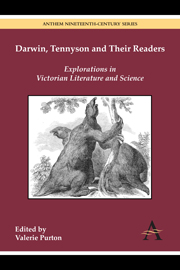Book contents
- Frontmatter
- Contents
- Introduction
- Chapter 1 Tennyson's ‘Locksley Hall’: Progress and Destitution
- Chapter 2 ‘Tennyson's Drift’: Evolution in The Princess
- Chapter 3 History, Materiality and Type in Tennyson's In Memoriam
- Chapter 4 Darwin, Tennyson and the Writing of ‘The Holy Grail’
- Chapter 5 ‘An Undue Simplification’: Tennyson's Evolutionary Afterlife
- Chapter 6 ‘Like a Megatherium Smoking a Cigar’: Darwin's Beagle Fossils in Nineteenth-Century Popular Culture
- Chapter 7 ‘No Such Thing as a Flower […] No Such Thing as a Man’: John Ruskin's Response to Darwin
- Chapter 8 Darwin and the Art of Paradox
- Chapter 9 Systems and Extravagance: Darwin, Meredith, Tennyson
- Chapter 10 T. H. Huxley, Science and Cultural Agency
- Notes on Contributors
Chapter 7 - ‘No Such Thing as a Flower […] No Such Thing as a Man’: John Ruskin's Response to Darwin
- Frontmatter
- Contents
- Introduction
- Chapter 1 Tennyson's ‘Locksley Hall’: Progress and Destitution
- Chapter 2 ‘Tennyson's Drift’: Evolution in The Princess
- Chapter 3 History, Materiality and Type in Tennyson's In Memoriam
- Chapter 4 Darwin, Tennyson and the Writing of ‘The Holy Grail’
- Chapter 5 ‘An Undue Simplification’: Tennyson's Evolutionary Afterlife
- Chapter 6 ‘Like a Megatherium Smoking a Cigar’: Darwin's Beagle Fossils in Nineteenth-Century Popular Culture
- Chapter 7 ‘No Such Thing as a Flower […] No Such Thing as a Man’: John Ruskin's Response to Darwin
- Chapter 8 Darwin and the Art of Paradox
- Chapter 9 Systems and Extravagance: Darwin, Meredith, Tennyson
- Chapter 10 T. H. Huxley, Science and Cultural Agency
- Notes on Contributors
Summary
In the last of the five volumes of Modern Painters, published in 1860, 17 years after the project began, John Ruskin proclaims what he calls ‘the Law of Help’. He has been talking about composition in painting — about the way the individual parts of a picture contribute to the whole — and he then goes on to affirm such collaboration as the ruling principle of nature itself:
[I]n a plant, the taking away of any one part […] injure[s] the rest. Hurt or remove any portion of the sap, bark, or pith, the rest is injured. If any part enters into a state in which it no more assists the rest, and has thus become ‘helpless’, we call it ‘dead’.
The power which causes the several portions of the plant to help each other, we call life. Much more is this so in an animal. (7:205)
And of course (he goes on) still more so in humans. He goes so far as to retranslate the old Anglo-Saxon word ‘holy’ as ‘helpful’, so that God becomes ‘the Helpful One’ (7:206). This discussion completed, he then announces his ‘Law’:
A pure or holy state of anything, therefore, is that in which all its parts are helpful or consistent. They may or may not be homogeneous. The highest or organic purities are composed of many elements in an entirely helpful way. The highest and first law of the universe — and the other name of life is, therefore, ‘help’.
- Type
- Chapter
- Information
- Darwin, Tennyson and their ReadersExplorations in Victorian Literature and Science, pp. 97 - 108Publisher: Anthem PressPrint publication year: 2013



